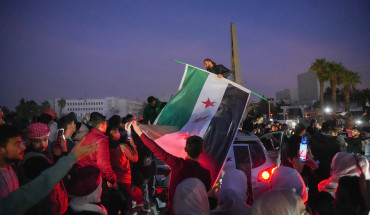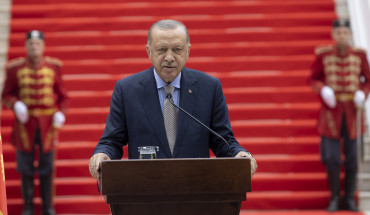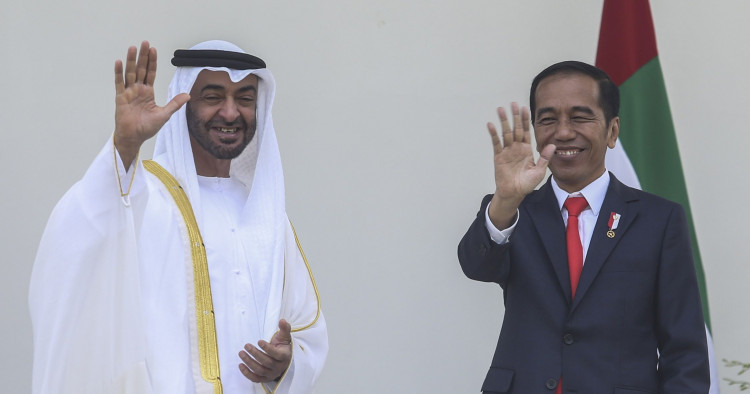Over the past 20 years, Indonesia — the world’s fourth most-populous country and the largest Muslim-majority nation — has evolved into a democracy based on tolerance and a moderate interpretation of Islam, and has emerged as one of Asia's fastest-growing economies. This article is part of a series on “Indonesia and the Middle East: Exploring Connections,” which examines the nature, scope, and implications of Indonesia's ties with the MENA region. See more ...
Commercial and religious ties between the
In this context, growing trade and investment relations with GCC states, notably Saudi Arabia and the United Arab Emirates (UAE), became the norm in the 2010s, building up to King Salman’s visit with a 1,500-member entourage in 2017. Indonesia, with a population of around 275 million (representing about 40% of Southeast Asia) and the largest economy in the Association of Southeast Asian Nations (ASEAN), is set to play a more prominent role in the Indo-Pacific region in the coming years. As a non-aligned state with a preference for a multipolar world order, it also fits well into Saudi Arabia and the UAE’s long-term hedging strategies beyond traditional security ties with the United States.
Greater GCC state engagement has coincided with the presidency of Joko Widodo, who has, since being elected in 2014, pursued policies associated with expanding Indonesia’s role in international affairs. In 2020, Indonesian Foreign Minister H.E. Retno Marsudi outlined the state's 4+1 foreign policy priorities, including: “strengthening economic diplomacy; protection diplomacy; sovereignty and nationality diplomacy; and Indonesia's role in the region and globally. While the plus one is strengthening the infrastructure of diplomacy.”[2] As leader of a Muslim nation, it is logical that President Widodo would forge closer economic ties, particularly with the UAE, an entrepôt state through which Indonesia can expand ties in Africa and the wider Middle East. Attracting more inward investment will be vital in developing the new Indonesian capital in
Saudi Arabia
Saudi-Indonesian economic relations were rejuvenated by King Salman's visit during his Asian tour in 2017 where Memorandum of Understanding were signed in areas such as trade, education, health, culture, pilgrimage, tourism, information sharing, science and technology, civil aviation, fisheries, security, defense, and counterterrorism. A Small to Medium Enterprise (SME) initiative was set up in 2021 to realize potential in generating up to $60 million in trade.[3] But Riyadh’s lack of broad-based economic growth (its main export to Indonesia being oil), and the lack of supply-demand connectivity continue to undermine economic relations. For example,
The execution of two female Indonesian domestic workers in the kingdom who were found guilty of murder in 2015 drew attention to the issue of migrant workers’ rights. The Indonesian Minister of Manpower, Muhammad Hanif Dhakiri, said at the time that “there are no standardized labor regulations that bind the said [Middle East] countries, to the detriment of migrant workers.”[5] There was a moratorium on Indonesian workers sent to the kingdom from 2011 to 2015, and a new deal was reached between Saudi Arabia and Indonesia in October 2018. This included the introduction of a new electronic system to better recruit, track, and protect workers’ contractual rights.[6] While it remains unclear whether such a system will resolve the issue of workers’ rights, a combination of changes to the Kafala system in Saudi Arabia in March 2021 may go some way to addressing the challenge. However, reduced demand for expatriate labor during Covid-19 will translate into lower remittances. The issue is one which informs Indonesian protection diplomacy and continues to plague Gulf-Southeast Asian relations more broadly, with recent emphasis on agencies and human traffickers.[7]
On security issues, Saudi Arabia and Indonesia signed a defense cooperation agreement (DCA) in 2014, covering training, education, counterterrorism, and defense industry cooperation, reflecting the kingdom’s aim of building and expanding an indigenous defense industry. Following a similar Saudi deal with Pakistan, the counterterrorism element is compelling as it serves to limit reputational damage and enhance Saudi and Indonesian membership of the Global Counterterrorism Forum (GCTF), which is designed to share good practice.
The United Arab Emirates
Like Saudi Arabia, the UAE has developed its commercial relations with Indonesia predominantly in the 2010s. In 2017 the UAE invested $2 billion in the Indonesian economy. The rationale for their bilateral relations, which have become more strategic over time, is linked to the economic rise of Indonesia as a regional hub, regional power, and G20 economy which can contribute to the UAE’s diversification and economic growth. As a proponent of moderate Islam, tolerance and diversity,
The UAE has become a valuable economic partner to Indonesia, especially when $23 billion worth of deals were signed during Crown Prince Mohammed bin Zayed's visit to Indonesia in 2019.[12] They targeted Abu Dhabi National Oil Company supplies in the region, and were extended to include education, health, agriculture and counterterrorism cooperation.[13] In April 2021, UAE Energy Minister for Energy and Infrastructure, Suhail Al-Mazrouei, suggested that the UAE may invest in Indonesian Covid-19 vaccine production.[14] In September 2021, the UAE and
The UAE stated in March 2021 that it is also investing $10 billion in Indonesia’s sovereign wealth fund, the Indonesia Investment Authority.[16] Abu Dhabi Investment Authority (ADIA) is investing $400 million in Indonesia's GoTo Group as part of its pre-IPO fundraising. It is ADIA's first principal investment in southeast Asia and its biggest investment in
The UAE agreed to invest $32.7 billion across a range of industries in
MBZ will be guest of honor at the G20 summit in
On defense, both states are members of the Indian Ocean Navy Symposium (IONS), a initiative to increase naval cooperation, and the UAE was Chair of the Indian Ocean Rim Association (IORA) from 2020-2021, in which Indonesia is also a member. The UAE and
Great Power Competition: The Gulf and the Indo-Pacific
As
Generally, there is a bigger opportunity for
Conclusion
Given Saudi and Emirati preoccupation with the Iranian threat, a historical lack of engagement with
[1] A point noted by Saudi Ambassador to
[2] Embassy of the Republic of Indonesia in Ankara, Turkey, “Annual Press Statement Indonesia Minister of Foreign Affairs Year 2020: Diplomacy Priorities 4+1 #Diplomacy for Peace and Prosperity,” January 8, 2020, https://kemlu.go.id/ankara/en/news/4152/annual-press-statement-indonesia-minister-of-foreign-affairs-year-2020-diplomacy-priorities-41-diplomacy4peaceandprosperity#:~:text=Furthermore%2C%20Foreign%20Minister%20Retno%20conveyed,diplomacy%3B%20and%20Indonesia's%20role%20in.
[3] Ismira Luftia Tisnadibrata, “Indonesia Campaign Helps SMEs Enter Saudi Market,” Arab News, January 19, 2021, https://www.arabnews.com/tags/saudi-indonesian-trade.
[4] OEC, “Indonesia/Saudi Arabia,” https://oec.world/en/profile/bilateral-country/idn/partner/sau.
[5] Hilary Whiteman, “Indonesia Maid Ban Won’t Work in
[6] “Saudi Arabia, Indonesia Reach Agreement Over Domestic Workers,” Arab News, October 13, 2018, https://www.arabnews.com/node/1386861/saudi-arabia.
[7] Katie McQue, “Sold into Syrian Servitude, Filipina Workers Tell of Abuse, Rape and Imprisonment,” The Washington Post, January 24, 2021, https://www.washingtonpost.com/world/middle_east/trafficking-migrant-workers-syria-uae/2021/01/24/1d79e43c-3f0d-11eb-b58b-1623f6267960_story.html.
[8] Ministry of Foreign Affairs of the Republic of Indonesia, “Indonesia and Counter-Terrorism Efforts,” April 7, 2019, https://kemlu.go.id/portal/en/read/95/halaman_list_lainnya/indonesia-and-the-counter-terrorism-efforts.
[9] Francesco Milan, “The Return of ISIS? Jihadis Fleeing into Asia and Detainees in Syria and Iraq Pose a Greater Danger than Terrorists Returning Home,” King’s College London, July 16, 2020, https://www.kcl.ac.uk/news/the-return-of-isis-jihadis-fleeing-into-asia-and-detainees-in-syria-and-iraq-pose-a-greater-danger-than-terrorists-returning-home.
[10] Stephanie Kirchgaessner, “Saudis Used ‘Incentives and Threats’ to Shut Down UN Investigation in
[11] There were concerns raised also by United Malays National Organisation of Malaysia that the Islamic Summit hosted by the Malaysian government in December 2019 had undermined efforts to increase the Malaysian Hajj quota. James Piscatori, “Allocating ‘God’s Guests’: The Politics of Hajj Quotas,” HH Sheikh Nasser al-Mohammad al-Sabah Publication Series 32, May 2021: 13.
[12] “Indonesia, UAE Sign Business Deals Worth About $23 Billion: Widodo,” Reuters, January 13, 2020, https://www.reuters.com/article/us-indonesia-emirates-deals/indonesia-uae-sign-business-deals-worth-about-23-billion-widodo-idUSKBN1ZC08R.
[13] Ibid.
[14] “UAE May Invest in a COVID Vaccine Production Facility in Indonesia,” Arab News, April 12, 2021, https://www.arabnews.com/node/1841736/business-economy.
[15] “UAE, Indonesia Launch Talks on Comprehensive Economic Partnership Agreement',” Emirates News Agency, September 6, 2021, https://www.wam.ae/en/details/1395302967399.
[16] Binsal Abulkader, “Exclusive: Indonesia, UAE ‘Like Brothers’, Can Work Together to Promote Moderate Islam, Says Joko Widodo,” Emirates News Agency, November 4, 2021, http://wam.ae/en/details/1395302988994.
[17] Chad Bray, “Abu Dhabi Investment Authority to Invest US$400 Million in Indonesia’s GoTo Group,” South China Morning Post, October 20, 2021, https://www.scmp.com/business/banking-finance/article/3153047/abu-dhabi-investment-authority-invest-us400-million.
[18] Ismira Lutfia Tisnadibrata, “UAE Breaks Ground for Sheikh Zayed Mosque Replica in Indonesia,” Arab News, March 8, 2021, https://www.arabnews.com/node/1821616/world.
[19] “UAE to Invest $32.7b in Indonesia,” The Strait Times, November 7, 2021, https://www.straitstimes.com/asia/se-asia/uae-to-invest-327b-in-indonesia.
[20] “Indonesia: UAE Crown Prince to Lead New Capital Construction,” VOA News, January 14, 2020, https://www.voanews.com/a/east-asia-pacific_indonesia-uae-crown-prince-lead-new-capital-construction/6182565.html.
[21] “Indonesia: UAE Crown Prince to Lead New Capital Construction,” Associated Press, January 14, 2020, https://www.voanews.com/a/east-asia-pacific_indonesia-uae-crown-prince-lead-new-capital-construction/6182565.html.
[22] Trump White House Archives, “U.S. Strategic Framework for the Indo-Pacific,” https://trumpwhitehouse.archives.gov/wp-content/uploads/2021/01/IPS-Final-Declass.pdf.
The Middle East Institute (MEI) is an independent, non-partisan, non-for-profit, educational organization. It does not engage in advocacy and its scholars’ opinions are their own. MEI welcomes financial donations, but retains sole editorial control over its work and its publications reflect only the authors’ views. For a listing of MEI donors, please click here.












